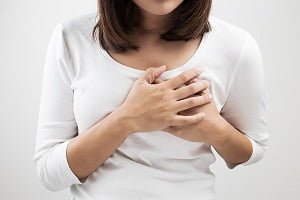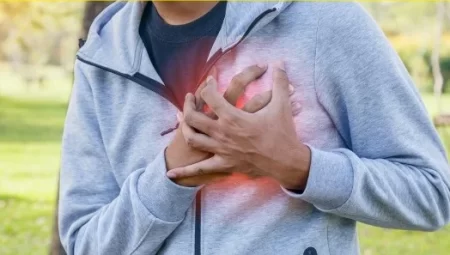What Are the Symptoms of Arrhythmia?
- Updated on: Jul 9, 2024
- 2 min Read
- Published on Apr 19, 2021

Almost all of us have felt very fast heart beats some times in our lives. You might experience as your heat is skipping the beats. These can be early signs of arrhythmia, which means you might have abnormal or irregular heartbeat.
Generally, arrhythmias may not cause any signs or symptoms. Your doctor generally detects them during a routine examination. Even if you notice any signs and symptoms, it does not necessarily mean you have a serious problem.
Signs and symptoms of arrhythmia
Arrhythmias can produce many symptoms. These may include, such as:
- Chest pain
- Shortness of breath
- A fluttering in your chest, palpitations: a feeling that your heart is skipping the beats or beating too fast
- A fast heartbeat (tachycardia)
- A slow heartbeat (bradycardia)
- Lightheadedness or dizziness
- Sweating
- Fainting or nearly fainting
- Anxiety
- Weakness
- Feeling pauses between heartbeats
- An irregular heartbeat
Arrhythmias are of several types. Read about types of arrhythmias.
Different types of arrhythmia may show different symptoms. Symptoms specific to the most common types of arrhythmia are explained below.
Symptoms of bradycardia
Bradycardia occurs when your heart beats slower than normal rate. Its symptoms are:
- angina (chest pain)
- difficulty during heavy activity such as while exercising
- lightheadedness
- dizziness
- sweating
- fatigue
- palpitations
- syncope (fainting or nearly fainting)
- shortness of breath
- trouble in concentration
Symptoms of tachycardia
Tachycardia occurs when your heart beats faster than normal rate. Common symptoms are:
- dizziness
- fainting, or nearly fainting
- fluttering in the chest
- chest pain (angina)
- lightheadedness
- breathlessness (dyspnea)
- weakness all of a sudden
Symptoms of atrial fibrillation
Atrial fibrillation occurs when the upper chambers of the heart beat in an irregular pattern asynchronously with the lower chambers. Common symptoms are:
- angina (chest pain)
- dizziness
- weakness
- palpitations
- fainting, or nearly fainting
- breathlessness
There is nothing to worry if you’ve experienced these symptoms occasionally. Arrhythmias are very common, in particular in old age. Millions of people have them every year.
In most cases, these do not pose any danger. But, sometimes arrhythmias can be extremely dangerous and require urgent treatment and management. You should meet your doctor if you have felt any of these symptoms too often.
When to call a doctor
The symptoms of arrhythmias are generally ignored. You should consult your doctor if you notice symptoms of arrhythmias. If you experience severe symptoms, it may require a need for immediate care.
The symptoms of arrhythmias match a few other conditions; your doctor will perform a diagnosis and tell you if you have heart rhythm problems or something else. Read about diagnosis of arrhythmias.
You should call your doctor if:
- your heartbeat is sometimes irregular
- you experience chest pain
- you are not able to control your heart rate after exercise, exercise also increases heart rate
- your heartbeat is racing or is too slow
- you feel dizzy or lightheaded
- you have fainted even once
- you feel heart is skipping beats
- you feel shortness of breath












